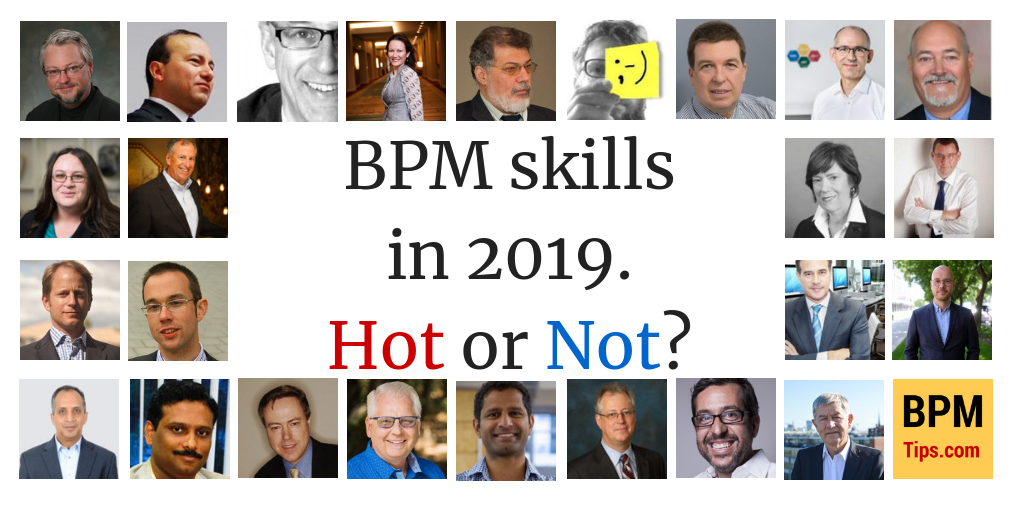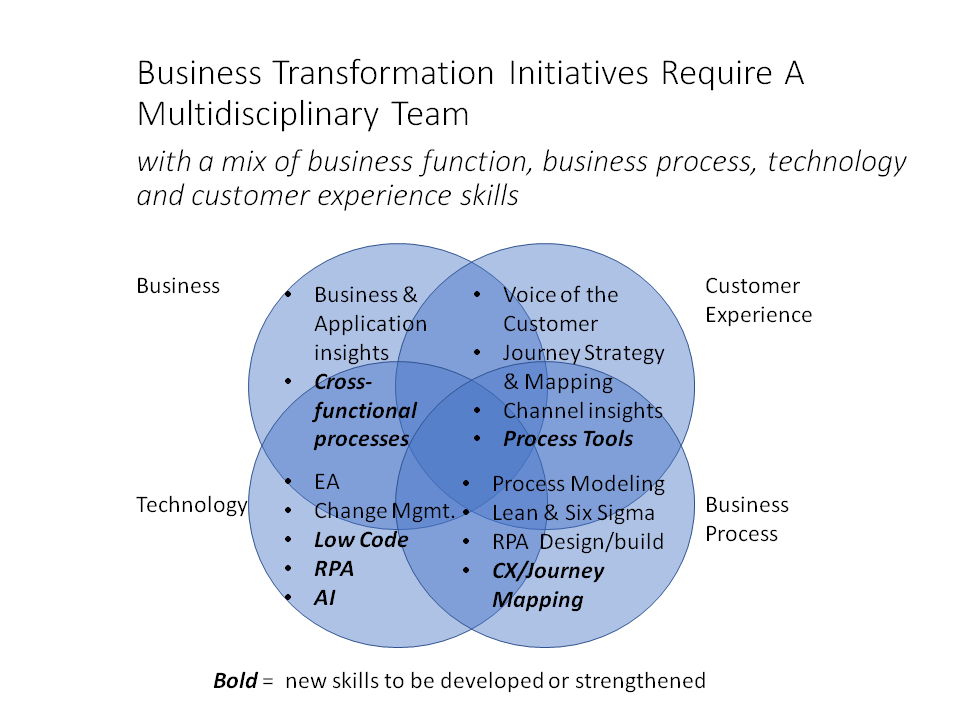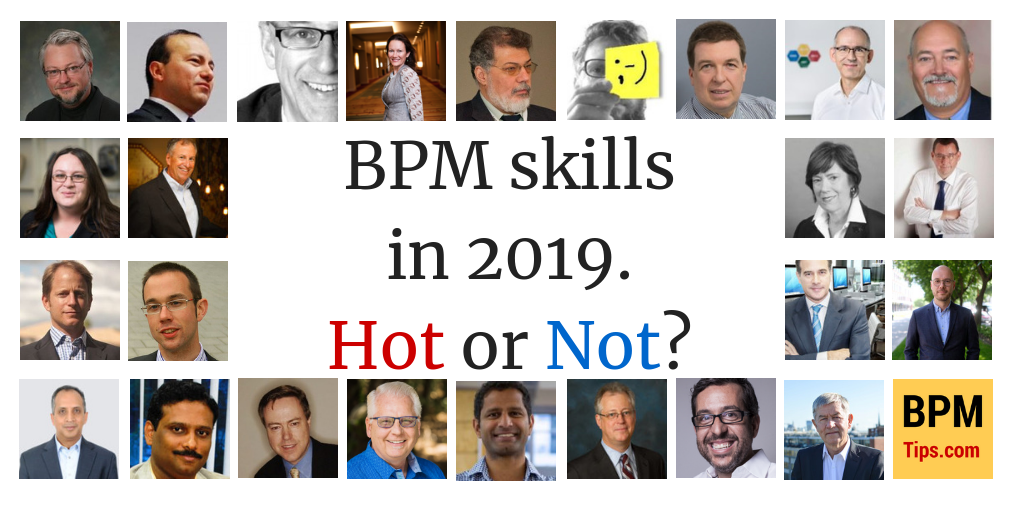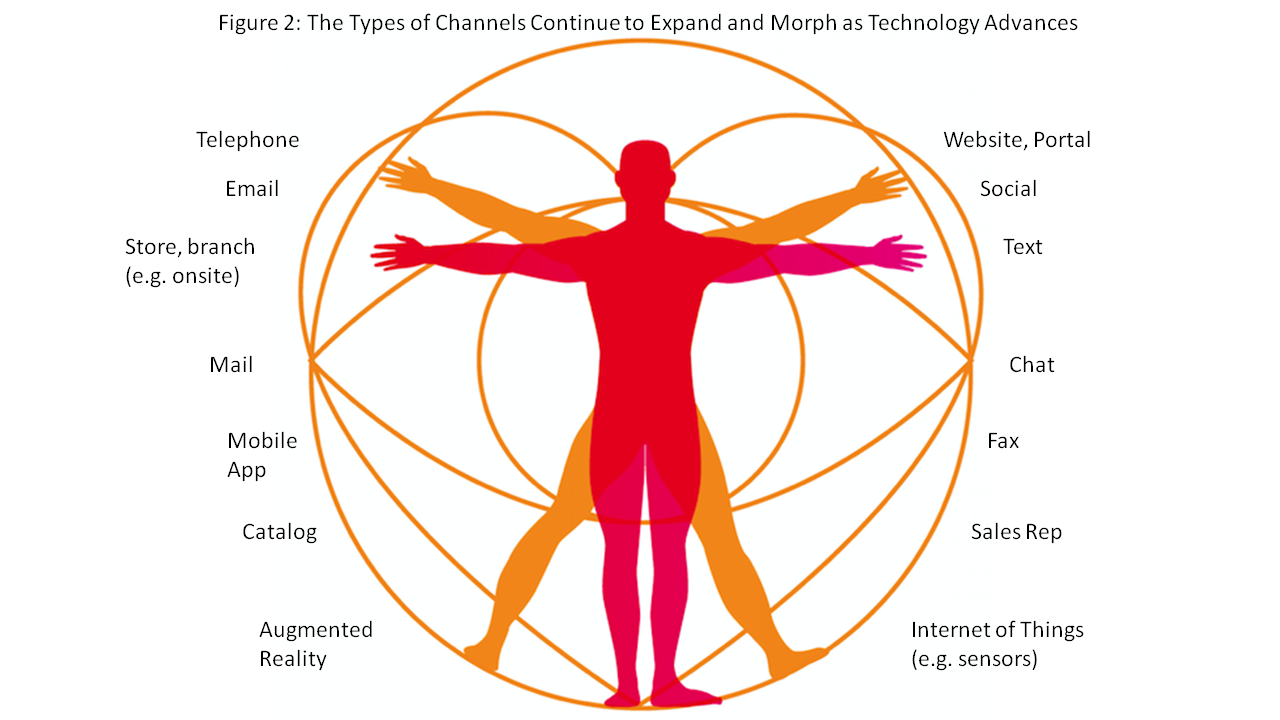Chances are you have big plans for this year. But how to make those plans turn into reality?
Even brightest idea does not transform into results without:
a) Good old-fashioned hard work
b) Knowledge what to do and how to do it.
I cannot help you with point a, but for point b… 🙂
As in previous years I prepared for you answers from experts about hot skills for process/automation professionals.
If you want to get more context take a look also at the 2018, 2017 (plus part 2), and 2016 version of this post.
You may also enjoy predictions for 2019 from top influencers at BPM.com.
Which BPM skills will be hot in 2019?
Below you can find answers from 20+ BPM experts. You can either read everything or use the navigation below. Enjoy!

Lloyd Dugan
Marlon Dumas
Ian Gotts
Barbara Hodge
Cristian Ivănuș
Emiel Kelly
Mathias Kirchmer
Harald Kühn
Bob Larrivee
Holly Lyke-Ho-Gland
John Mancini
Connie Moore
Juergen Pitschke
Brian Reale
Adrian Reed
Pedro Robledo
Michal Rosik
Pramod Sachdeva
Suresh Sambandam
Phil Simpson
Jim Sinur
Shik Sundar
Keith Swenson
Miguel Valdés-Faura
Leslie Willcocks
Now, let’s dive into the answers.
Lloyd Dugan
 Lloyd Dugan is a widely recognized thought leader in the development and use of leading modeling languages, methodologies, and tools, covering from the level of EA and BA down through BPM, Case Management, and SOA. He specializes in the use of standard languages for describing business processes, systems, and services, particularly BPMN, CMMN, and DMN from the OMG. He has developed and delivered BPMN 2.0 training to the U.S. Department of Defense and large consultancies. He has nearly 30 years of experience with public and private sector clients, and has an MBA from the Fuqua School of Business at Duke University. He is an OMG-Certified Expert in BPM (OCEB) – Fundamental, a member of the Workflow Management Coalition and its BPSim Working Group, a member of the OMG’s BPMN Model Interchange Working Group (MIWG), and a Contributing Member (author), Meta Modeling and BPM-BA Alignment Collaboration Teams Member, and Advisory Board Member of the Business Architecture Guild. He is a frequent speaker at national and international conferences on BPM, BPMN, Case Management, SOA, and BA. He is a published author or co-author on BPM, BPMN, and BA. He serves as the Chief Architect for Business Process Management, Inc. (see www.bpm.com), for whom he delivers BPM-related training and client advisory services on BPM-related matters and technologies.
Lloyd Dugan is a widely recognized thought leader in the development and use of leading modeling languages, methodologies, and tools, covering from the level of EA and BA down through BPM, Case Management, and SOA. He specializes in the use of standard languages for describing business processes, systems, and services, particularly BPMN, CMMN, and DMN from the OMG. He has developed and delivered BPMN 2.0 training to the U.S. Department of Defense and large consultancies. He has nearly 30 years of experience with public and private sector clients, and has an MBA from the Fuqua School of Business at Duke University. He is an OMG-Certified Expert in BPM (OCEB) – Fundamental, a member of the Workflow Management Coalition and its BPSim Working Group, a member of the OMG’s BPMN Model Interchange Working Group (MIWG), and a Contributing Member (author), Meta Modeling and BPM-BA Alignment Collaboration Teams Member, and Advisory Board Member of the Business Architecture Guild. He is a frequent speaker at national and international conferences on BPM, BPMN, Case Management, SOA, and BA. He is a published author or co-author on BPM, BPMN, and BA. He serves as the Chief Architect for Business Process Management, Inc. (see www.bpm.com), for whom he delivers BPM-related training and client advisory services on BPM-related matters and technologies.
WWW: BPM.com
WWW: LI profile
What are the skills and techniques that can help BPM practitioners create value for their organizations in 2019?
Modeling skills remain key, but BPMN is still key as it has new life in describing the procedural/algorithmic business logic being automated as first-gen RPA. (In first-gen RPA, existing applications are re-purposed as more efficient STP processing sequences, avoiding the need for more invasive and disruptive refactoring.) However, BPMN as the dominant modeling language is giving ground to DMN (and a bit to CMMN) as more of the spectrum of structured vs. unstructured business processes are addressed by BPM practitioners. (Integrated modeling with all 3 languages is also gaining ground, as the effort between the Department of Veterans Affairs, the Mayo clinic, and various academic institutions showcases this in health care situations.) Model management skills are emerging as key, in which business processes in an enterprise can have both standard forms and field-level variants, all of which are to be understood together. Grounding in Business Architecture disciplines is also a key skill nowadays, requiring BPM practitioners to know how to create/apply value streams, capability maps, and customer journey maps that cross-reference process models as part of BPM work.
What are the best resources to learn those skills? (e.g. books, articles, courses)
Books and training courses are available for all of these skill sets, but supporting tools required some savvy to find. Only a handful of process modeling tools support all 3 standards, and pocess model management is still only enabled by a subset of the process modeling tools out there. BPM aggregator sites as well as vendor sites are rich sources of best practices, available webinars, etc. for learning these skills. Business Architecture skills really require some training, or apprenticing at the side of actual Business Architects.
Which skills are no longer relevant or not practically applicable yet (hype)?
BPM skills are still relevant and practical, but DMN (and, to a lesser extent, CMMN) are increasingly more relevant and practical (especially as use becomes more commonplace). As always, BPM as a discipline requires analytical skill sets at least as much as those required by the automation engines. However, as these engines are increasingly “low coding”, meaning that more and more of the design work is less and less development on technical developer skill sets, the BPM practitioner will be increasingly pulled into automation design work. Work with RPA will drive this extension even further, but more work with the technology needs to occur for critical masses of best practices to accumulate in sufficient quantities to make this skill set practically applicable.
Prof. Marlon Dumas
 Marlon Dumas is Professor of Software Engineering at University of Tartu, Estonia where he leads a team of 15 researchers focused on Business Process Management (BPM). Previously, he was faculty member at Queensland University of Technology and visiting researcher at SAP Research, Australia, where he led several BPM-related applied research projects. Prof. Dumas has provided consultancy and training to a dozen organizations in Australia and the Baltics. He is co-inventor of six granted US/EU patents in the field of BPM and co-author of the textbook “Fundamentals of Business Process Management”, now used in more than 100 universities worldwide.
Marlon Dumas is Professor of Software Engineering at University of Tartu, Estonia where he leads a team of 15 researchers focused on Business Process Management (BPM). Previously, he was faculty member at Queensland University of Technology and visiting researcher at SAP Research, Australia, where he led several BPM-related applied research projects. Prof. Dumas has provided consultancy and training to a dozen organizations in Australia and the Baltics. He is co-inventor of six granted US/EU patents in the field of BPM and co-author of the textbook “Fundamentals of Business Process Management”, now used in more than 100 universities worldwide.
WWW: WWW
WWW: LI profile
What are the skills and techniques that can help BPM practitioners create value for their organizations in 2019?
Broad-ranged data science skills have become an essential wrench in the toolbox of process analysts. In the past two years, process mining and predictive process monitoring techniques have proven their value in a wide range of industries. Mastering these techniques is becoming imperative.
Strong competition from lean and highly specialized post-startup companies are a major challenge for traditional players (fintech, insurtech, agritech, etc.). A key advantage of traditional players is their ability to offer integrated and broad-ranged products. Skills in business process integration are likely to become valuable in 2019 and beyond. The need for integration is one of the key drivers behind robotic process automation. Companies need to glue together multiple (legacy) systems and break across silos faster than what can be achieved with full-scale IT integration projects. Skills in design and development of proactive services will be particularly valuable in the coming years.
What are the best resources to learn those skills? (e.g. books, articles, courses)
First of all, in these times of rapid change, it is important to get the foundations right. Harmon’s Business Process Change, Franz and Kirchmer’s Value-Driven Business Process Management, vom Brocke and Rosemann’s Handbook of Business Process Management, and (sorry for the self-promotion) the Fundamentals of BPM, are references worth keeping at hand. Davenport’s recent writings on AI and robotic process automation, particularly those based on case studies, are a good complement to keep up with ongoing trends.
Which skills are no longer relevant or not practically applicable yet (hype)?
In the past two years, blockchain technology has been touted as a possible solution to long-standing cross-organizational business process integration problems. However, it appears that the current generation of blockchain technology will take a few more years of refinement to fulfill its promises. Skills in cross-organizational process integration using blockchain might be useful in future, but they will not be broadly applicable in the medium-term.
Big Data and AI have fallen victims of over-hype. Big Data skills are needed, but in relatively specialized settings. AI skills (beyond machine learning skills for predictive analytics) might become useful for process automation in a few years time, but again they will not be broadly applicable in the medium-term. Let’s hope that the over-hyping of AI will not result in a backslash as it did in the late 80s. There is a lot of latent value in the emerging generation of AI technology (e.g. chatbots), but due to its complexity, AI technology needs incremental adoption driven by a long-term vision.
We should never forget that process automation (and this is particularly true of AI-driven automation) is never total nor does it come for free. It comes with exception handling costs, contingency management costs, maintenance costs, integration costs, flexibility loss, etc. The cracks of automation are wider than we think. Those who master the skill of filling these cracks will be in a strong position to deliver value in their companies in the coming 5 years.
Ian Gotts
 Ian is a founder of Elements.cloud, tech advisor, investor, speaker and author.
Ian is a founder of Elements.cloud, tech advisor, investor, speaker and author.
Elements.cloud helps customers clean-up, document and build their app implementations, focused on Salesforce. But valid for any low code app platform, esp as the process mapping is free, for ever, for everyone.
WWW: https://medium.com/@Q9ELEMENTS
WWW: elements.cloud
WWW: LI profile
Twitter: @iangotts
What are the skills and techniques that can help BPM practitioners create value for their organizations in 2019?
Business analysis, critical questioning, challenging status quo (esp at senior level). Digital transformation is more revolution than evolution. Great read: https://www.mckinsey.com/business-functions/digital-mckinsey/our-insights/why-digital-transformation-is-now-on-the-ceos-shoulders
What are the best resources to learn those skills? (e.g. books, articles, courses)
Get the big picture, think about how your industry can transform, reengineer from the customer perspective, understand industry drivers and compliance, follow @iangotts !! BTOES conference, TED talks.
Which skills are no longer relevant or not practically applicable yet (hype)?
Understanding different technical standards UML, BPMN, DMN. RPA and AI are still emerging so practical skills are not very usable and standard/approaches are still evolving…. wait and see how they turn out.
Barbara Hodge
 Barbara Hodge is SSON’s Global Editor, and has been with the organization since 2000, having joined to launch Shared Services News. She is now responsible for SSON’s online portal content, including industry reports, case studies, surveys, interviews, etc. – as well as everything else that makes SSON the most trusted space for practitioners from around the world.
Barbara Hodge is SSON’s Global Editor, and has been with the organization since 2000, having joined to launch Shared Services News. She is now responsible for SSON’s online portal content, including industry reports, case studies, surveys, interviews, etc. – as well as everything else that makes SSON the most trusted space for practitioners from around the world.
Barbara uses her extensive industry knowledge and connections to provide a unique perspective on the latest trends and developments across the SS&O landscape. She is the voice of ssonetwork.com, SSON’s online content portal, and she regularly conducts interviews with key industry figures to ensure SSON is a one-stop shop for shared services and outsourcing resources.
Prior to joining SSON, Barbara was Editorial Director at Armstrong Information, a London-based specialist publishing firm, with responsibility for launch and editorial content management for a number of management journals, including corporate communication, change management and business process reengineering. She started her career with Deutsche Bank Capital Markets in London.
WWW: http://www.ssonetwork.com
WWW: LI profile
Twitter: @ssonetwork
Twitter: @abrakabarbara
What are the skills and techniques that can help BPM practitioners create value for their organizations in 2019?
The trend this year is toward Centers of Excellence as the key levers of process productivity and process performance. According to SSON’s 2019 industry survey, more than two thirds of shared services have chosen to set up COEs.
In addition, automation is of course a critical strategy and is fast becoming “the way business is being done”. This means that processes are becoming more reliable, cost-effective, and standardized with less deviation.
What are the best resources to learn those skills? (e.g. books, articles, courses)
SSON online (www.ssonetwork.com) It is the most trusted online resource for executives tasked with process performance. As such we host webinars, white papers, networking activities at our conferences around the world, and various other opportunities to share best practices across the industry.
Which skills are no longer relevant or not practically applicable yet (hype)?
One trend that is certainly being hyped up, although not without reason, is the appetite for evolved intelligent automation solutions such as machine learning and artificial intelligence. These types of skills [i.e. automation centric] will become significantly more important. Connected to this will be skilled around data analytics that emerged from automation. However, to answer your question more correctly, the traditional functional skills will perhaps become proportionately less important as automation takes over rules-based work, and centers of excellence hone functional and process-based expertise. While additional “process expertise” is therefore taken over by technology, humans can shift their attention to value adding analytics based competencies.
Cristian Ivănuș
 Cristian Ivanus is a BPM Solutions Architect & RPA Practice Lead at NTT DATA Romania.
Cristian Ivanus is a BPM Solutions Architect & RPA Practice Lead at NTT DATA Romania.
Cristian is also managing the Romanian ABPMP Chapter.
WWW: LI profile
What are the skills and techniques that can help BPM practitioners create value for their organizations in 2019?
I consider that along the years, BPM practitioners should learn continuously and improve techniques from the real projects. BPM practitioners should be able to understand both business and technical aspects of this management discipline having in mind the actual trends in the global business, so called “digital transformation”.
Digital transformation roadmap of any company should include, in my opinion, a dedicated stage for describing and documenting existing processes in the business followed by clear plans for automation using BPM Software, Robotic Process Automation or other software tools and techniques for improving the quality of the business and getting more value.
In the list of mandatory skills for BPM practitioners I would include:
– Process discovery skills.
Because understanding BPM concepts is not always formalized in many companies, prior to any initiative, people who are part of the process (process owners, process controllers, performers and any other roles involved along the pathway of the process), awareness session should be the entry point in the project. The aim of this session is to create a common understanding of the processes amongst the participants. At the end of this session, people should be able to define the list of the processes of the company organized in three categories (core processes, support processes and management processes).– Process analysis skills
Process analysis is one of the most important skills that must be demonstrated by BPM practitioners because the quality of the analysis is the key factor for identification of optimization or improvement initiatives. Main tool for analysis is the direct interview with the process participants. Process analyst should have the ability to “extract” from interlocutors appropriate details for modeling the process, because the aim is to create the abstract representation of the process steps and the interfaces between different other processes. Another tool required in the process analysis phase is a modeling tool. Personally, I am using BPMN 2.0 for process modeling because using this standard it is possible to identify and represent process details at the most detailed level.Apart from the analytical and technical skills, process analyst should have few behavioral skills like patience, ability to listen and empathy. This will create an invisible link between process analysts and process participants.
– Lean and/or Six Sigma skills.
In many cases, lean and/or six sigma skills will help practitioners to identify deep process problems applying specific techniques like: identify waste, apply root cause analysis for process problems, use experimental solution design, measurement and control of the process variations, etc.These advanced tools should be chosen when traditional improvements techniques are not applicable.
What are the best resources to learn those skills? (e.g. books, articles, courses)
There is no a comprehensive list of resources that can be used. There are a lot of excellent books that may be used as a reference for learning or completing the skills. Amongst these books (the list is not exhaustive, of course) I would recommend:
– Business Process Management: Practical Guidelines to Successful Implementations by John Jeston;
– Fundamentals of Business Process Management by Marlon Dumas, Marcello La Rosa, Jan Mendling and Hajo A. Reijers;
– BPMN 2.0 by Thomas Allweyer;
– Business Analysis by James Cadle, Malcom Eva, Keith Hindle & others.
Which skills are no longer relevant or not practically applicable yet (hype)?
I would say that skills are evolving. The complexity of the businesses requires a deep understanding of the methodological framework for providing appropriate solutions for business processes improvements.
Combining business skills with vision about appropriate technology solution that may be applied, will offer any BPM initiative the satisfaction for better and performant processes.
The essential skills enumerated in the previous section requires discipline, rigor and tenacity but offers a huge professional satisfaction when measuring the results of the solutions applied for business improvements.
Emiel Kelly
 Emiel has been working as a trainer and consultant for vendors of software like BPM tooling, since 1999. He also started his own initiative, Procesje.nl, a valuable source of practical and common sense information about Business Process Management and how to avoid blindly following the trends.
Emiel has been working as a trainer and consultant for vendors of software like BPM tooling, since 1999. He also started his own initiative, Procesje.nl, a valuable source of practical and common sense information about Business Process Management and how to avoid blindly following the trends.
Emiel is known from his practical and unorthodox approach to BPM.
He is also a contributor to bpm.com where he is a very active participant of discussion forums. You can also find lots of his both informative and entertaining tweets on Twitter.
WWW: http://procesje.blogspot.nl
WWW: LI profile
Twitter: @Procesje
What are the skills and techniques that can help BPM practitioners create value for their organizations in 2019?
Processes (and the management of them) brings a lot of aspects of an organization together. I’ve seen a lot of organizations where a lot of separate initiatives work on the same processes without talking to each other, Think about Lean, Datamanagement, Building new systems, Compliance, etc. Sometimes they are even counterproductive.
To me the most important BPM skill is bring those initiatives together, Make organizations understand that working on the same processes from different inititiatives is the new sub uptimization. It’s like making your car very fast by tuning the engine but forget to adjust the suspension and brakes.
What are the best resources to learn those skills? (e.g. books, articles, courses)
Not specific, but any resource that helps you to understand what makes a process perform. And that’s not a picture of blocks and arrows,
Which skills are no longer relevant or not practically applicable yet (hype)?
As a BPM professional you have to worry about processes, not about BPM systems, They’re just a means to implement a process the way you want.
Of course it might be interesting to know about techniques like AI, RPA etc, but to me that doesn’t make you a BPM professional but an AI or RPA expert.
Dr. Mathias Kirchmer
 Dr. Kirchmer is a visionary leader, thought leader and innovator in the field of Business Process Management (BPM), successfully integrating business and technology initiatives. He has combined his broad business experience with his extensive academic research to deliver pioneering management approaches that have proven to be both, sustainable and provide immediate benefits.
Dr. Kirchmer is a visionary leader, thought leader and innovator in the field of Business Process Management (BPM), successfully integrating business and technology initiatives. He has combined his broad business experience with his extensive academic research to deliver pioneering management approaches that have proven to be both, sustainable and provide immediate benefits.
Most recently, Dr. Kirchmer founded BPM-D, a company focused on enabling ongoing digital transformation and strategy execution through the discipline of BPM. Before he was Managing Director and Global Lead of BPM at Accenture, and CEO of the Americas and Japan of IDS Scheer, known for its ARIS Software.
Dr. Kirchmer has published 11 books and over 150 articles. He is affiliated faculty at the University of Pennsylvania and teaches regularly at several other universities. In 2004, he received a research and teaching fellowship from the Japan Society for the Promotion of Science.
WWW: LI profile
WWW: http://bpm-d.com
Twitter: @mtki2006
What are the skills and techniques that can help BPM practitioners create value for their organizations in 2019?
Here are six key skills I see for 2019 and the following years in the field of business process management (BPM):
* Digital Transformation Management: Process management becomes the discipline of digital transformation management, leveraging new technologies as improvement approaches. Hence, BPM practitioners need to prioritize, scope, and execute digital transformation initiatives as well as manage the related value identification and realization. They need to provide the approach to align people, products and processes for the digital world. The BPM-Discipline has to be managed as the value-switch for digital business transformation.
* Focused Agile Process Improvement: The volatile business environment requires a fast adaptive approach to improvements and transformation. However, there is also a big need to set clear direction and focus. The combination of agile principles, like the fast realization of process improvements in different stages, with top down approaches and supporting digital tools, such as process mining or prioritization applications, address those challenges. Integrated customer journey planning becomes a major component of process improvements to ensure an outside-in view and the right degree of standardization. Hence, a new combination of improvement skills is required.
* Value-driven Robotic Process Automation (RPA): RPA continues to close the automation gap of traditional applications to deliver significant efficiency gains and other benefits. However, this requires a thought-through process-led approach that considers up and down-stream effects of (ro)bots and realizes their full potential. BPM practitioners need to provide skills for a systematic approach to realizing value through RPA, leveraging process modelling and repositories, process mining and other process management tools.
* Business Context for Artificial Intelligence (AI): More and more organizations are excited about the potential opportunities of AI and experiment with topics like Machine Learning (ML) or predictive analytics. In the coming months and years a key focus will be on identifying business scenarios to create best value through AI using appropriate data so drive the AI learning process. BPM practitioners need to provide process-led approaches to enable the outcome-driven use of AI.
* Integrated Process and Data Governance: Digital processes are only agile and deliver continued value if they are governed systematically across different departments. The new speed of digital execution accelerates negative effects of bad data quality. Therefore an integrated process and data governance becomes more and more crucial for successful digital processes. Skills do define appropriate governance processes, bodies, collaboration models and their integration into the organizations are very important.
* Hybrid Workforce Management: In the digital enterprise human and digital workforce co-exist. This requires an appropriate management approach to employees who have to resolve more and more often complex exception cases and specific individualized customer requirements. Standard processes are mainly supported through robots – that need to be adjusted and aligned with changing business environments, too. The resulting process-led hybrid workforce management is another key skill process practitioners need to provide.
What are the best resources to learn those skills? (e.g. books, articles, courses)
* A good overview over the topics mentioned is provided by industry organizations, like ABPMP or the BPM-Institute, and by specialized service firms like BPM-D. It is worth to compare training and education agendas to come up with the right mix.
* There are more and more eLearning offerings available covering at least some of those topics, such as the module “Strategy Execution in a Digital World: The BPM-Discipline” from BPM-D.
* A deeper and more comprehensive education in many of the areas mentioned is provided by academic institutions, such as Widener University (Master in Business Process Innovation) or the University of Pennsylvania (Program of Organizational Dynamics in the School for Arts and Sciences).
* In addition there are first books available covering those topics, such as “High Performance through Business Process Management – Strategy Execution in a Digital World” or “The Drivers of the Digital Transformation”.
Which skills are no longer relevant or not practically applicable yet (hype)?
I think many of the traditional statistical improvement tools and related traditional approaches, like e.g. Six Sigma, will continue to lose traction since their application in the office environment is too slow for the digital world.
Harald Kühn
 Dr. Harald Kühn is a member of the management board of the BOC AG. He is responsible for the product management and the related strategic aspects of BOC’s product portfolio. Dr. Harald Kühn works in the areas of metamodelling, BPM, EA and the usage of cloud technologies in these domains.
Dr. Harald Kühn is a member of the management board of the BOC AG. He is responsible for the product management and the related strategic aspects of BOC’s product portfolio. Dr. Harald Kühn works in the areas of metamodelling, BPM, EA and the usage of cloud technologies in these domains.
He is an author of over 20 publications about various aspects of BPM.
WWW: boc-group.com
WWW: LI profile
Twitter: @BOC_Group
What are the skills and techniques that can help BPM practitioners create value for their organizations in 2019?
Amongst many others, I see three areas in 2019 where BPM practitioners can create immediate value for their organizations:
1. Compliance
Many organisations need to show compliance to various standards and frameworks, depending on the markets they are acting in and in which type of industry they operate. In compliance initiatives such as data compliance, risk compliance, quality compliance, legal compliance etc., business process descriptions play a central role to provide input for an efficient compliance audit. By re-using existing work, BPM practitioners create immediate value for such initiatives reducing audit efforts and costs.2. Business Transformation
By extending BPM with aspects from Design Thinking and Storytelling e.g. such as Scenes, BPM practitioners create value for business model decisions and business scenario designs. The same for the transformation of the application and technology architecture e.g. by using BPMN and Archimate in the context of Cyber Physical Systems.3. Operational Excellence
State-of-the-art technology such as micro-service architectures, API-first approaches, mining and data science techniques allow the easy access to business-relevant runtime data, KPIs, execution frequencies etc. To combine these with business-level process definitions creates value and insight into process performance and gives the foundation for business process improvement e.g. using process simulation.
What are the best resources to learn those skills? (e.g. books, articles, courses)
– Open Model Initiative Laboratory (OMiLAB): http://www.omilab.org/
– Storytelling and Storyboards using Scenes: https://experience.sap.com/designservices/approach/scenes
– Archimate Forum: https://www.opengroup.org/archimate-forum
– Microservice Architecture: https://microservices.io/
Which skills are no longer relevant or not practically applicable yet (hype)?
Any knowledge and experiences gathered in the past will influence decisions for the future. Therefore, even if specific techniques or technologies are not really relevant any more, they are important to evaluate and apply new upcoming techniques and technologies.
Bob Larrivee
 Bob Larrivee is the President and Founder of Bob Larrivee Consultancy. With over 34 years in the industry, Bob is a recognized expert in the application of advanced technologies and process improvement to solve business problems and enhance business operations and Technology Jounalist for Document Strategy.
Bob Larrivee is the President and Founder of Bob Larrivee Consultancy. With over 34 years in the industry, Bob is a recognized expert in the application of advanced technologies and process improvement to solve business problems and enhance business operations and Technology Jounalist for Document Strategy.
During his career, Bob has developed many training courses, led many projects, and authored hundreds of eBooks, Industry Reports, Blogs, Articles, and Infographics. In addition, Bob has served as host and guest Subject Matter Expert on a wide variety of webinars, Podcasts, Virtual Events, and lectured at in-person seminars and conferences around the globe.
WWW: https://boblarriveeconsulting.com
WWW: LI profile
Twitter: @BobLarrivee
What are the skills and techniques that can help BPM practitioners create value for their organizations in 2019?
I think that one of the most valuable skills for folks in BPM, is that of being able to accurately map business processes, their information interdependencies, and the actors in a way that aligns to the business, compliance, and customer experience. Once the current state is truly known – most organizations are not fully aware of what is really happening – process improvement and automation can take place. There are many who believe automated process mapping software is the answer but I believe it still takes human insight to answer the question of why things are currently being done in a certain way and identify the potential impact of process change, cultural change, and automation will have on the business and organization.
Holly Lyke-Ho-Gland
 Building on more than 10 years of business research and consulting experience, Holly Lyke-Ho-Gland is a principal research lead who conducts and publishes APQC research on process management and improvement, quality, project management, measurement, and benchmarking for APQC’s Process and Performance Management research team. Her research supports APQC members and clients across disciplines and centers on helping professionals and project managers solve business problems with strategy, process and measurement.
Building on more than 10 years of business research and consulting experience, Holly Lyke-Ho-Gland is a principal research lead who conducts and publishes APQC research on process management and improvement, quality, project management, measurement, and benchmarking for APQC’s Process and Performance Management research team. Her research supports APQC members and clients across disciplines and centers on helping professionals and project managers solve business problems with strategy, process and measurement.
Holly regularly partners with other APQC research leads to look at improving the end-to-end business processes in areas such as procure-to-pay or order-to-cash where true improvement rests in the entire process versus one functional department. On a biannual basis, she conducts APQC’s extensive research survey and report on The Value of Benchmarking as well as annual surveys and reports on how organizations adopt and use the Process Classification Framework®.
WWW: https://www.apqc.org
WWW: LI profile
Twitter: @hlykehogland
What are the skills and techniques that can help BPM practitioners create value for their organizations in 2019?
According to both our 2018 and 2019 annual process and performance management priorities surveys BPM practitioners feel that their capabilities need to step up to stay relevant and provide value to their organizations. Namely they need to improve their change management skills and technological savvy:
1. Change management skills—process work, whether it’s tied to broad organizational initiatives or discrete process improvements, requires people change how they execute work. As shepherds of these projects BPM professionals need the tools and techniques necessary to engage people in changes and address resistance.
2. Technology capabilities—given that 75% of organizations are undergoing a digital transformation and BPM teams are tasked with supporting these initiatives, understanding technologies—what they are, what they can do, and just as importantly what they can’t do—is more important than ever before. Often the BPM teams work closely with IT to help identify when an improvement opportunity requires traditional process tools and/or could benefit from things like automation. Hence, BPM professionals need to understand the application of technologies, namely advanced analytics, data management, and process automation.
What are the best resources to learn those skills? (e.g. books, articles, courses)
There are several resources available for all these skills and the investment in them depends on the resources and budget you have available. For change management I would recommend seeing if your organization has an Organizational Change Management program or if your HR and Training groups have training available. If not, there are several great books and training programs available depending on the methodology you prefer—Kotter’s 8 Steps and PROSCI/ADKAR are two of my favorite methodologies.
For technology skills, these are much more accessible than they used to be. There are a wide variety of free courses available on all these topics. Many universities and groups like Coursera offer free programs on everything from data management to machine learning. I personally find these types of courses beneficial over books and articles because they are less academic and include lab work where you apply what you learn.
Which skills are no longer relevant or not practically applicable yet (hype)?
I don’t think that any skills are no longer relevant. Even in support of digital and new technology applications organizations still rely on BPM teams for traditional discovery, improvement, and re-engineering of processes. However, in many cases AI is not practically applicable yet. According to this year’s priorities survey only 26% of the organizations plan on investing in AI over the next 18 months. Most organizations are still working on getting their data house in order and building out their analytics capabilities and automation programs.
John Mancini
 John Mancini is the Chief Evangelist and Past President of AIIM. He is a well-known author and speaker on information management and digital transformation. As a frequent keynote speaker, John offers his expertise on Digital Transformation and the struggle to overcome Information Chaos. He blogs under the title Digital Landfill (http://info.aiim.org/digital-landfill), has more than 11,000 Twitter followers, 6,000 LinkedIn followers, and can be found on most social media as @jmancini77. He has published more than 30 e-books, the most recent being:
John Mancini is the Chief Evangelist and Past President of AIIM. He is a well-known author and speaker on information management and digital transformation. As a frequent keynote speaker, John offers his expertise on Digital Transformation and the struggle to overcome Information Chaos. He blogs under the title Digital Landfill (http://info.aiim.org/digital-landfill), has more than 11,000 Twitter followers, 6,000 LinkedIn followers, and can be found on most social media as @jmancini77. He has published more than 30 e-books, the most recent being:
* Leveraging Deep Learning and Machine Learning Capabilities
* Integrating Content Services into Low Code Applications
* Enhancing Your RPA Implementation with Intelligent Information
* How does the Office 365 Revolution Impact Governance and Process Automation?
* Automating Governance and Compliance
WWW: http://www.aiim.org
WWW: info.aiim.org/digital-landfill
WWW: LI profile
Twitter: @jmancini77
What are the skills and techniques that can help BPM practitioners create value for their organizations in 2019?
I think the key to creating value for BPM practitioners – both FOR and TO their organizations – is to understand the connections between BPM technologies and other enterprise systems. Some of the “connections” that I feel are particularly valuable:
* An understanding of the role that content and unstructured information plays as the fuel (or the “clog”) for business processes. The management and integration of this content cannot be treated as an afterthought.
* The connections that “big process” technologies like BPM have with tactical process improvement tools like Robotic Process Automation. Some view RPA as a replacement for BPM; I tend to see it as a complement to BPM. Each has their role, and understanding the connections between the two is a skill rising in importance.
* An understanding of the business process itself – and not just the technologies like BPM that help automate it – is increasingly important. As organizations have begun to look at their processes from the outside in rather than from an inside-out technology-centric perspective, it has created the need to view processes more holistically. And that means connections between processes. For example, the uber process of customer acquisition all the way through customer fulfillment is not a single process, but a system that connects multiple processes.
What are the best resources to learn those skills? (e.g. books, articles, courses)
When it comes to skills and resources, many know I have a long connection with AIIM, so I have a bias there. But in particular the annual Conference that AIIM does is a great place to explore the connections I mention above and the people charged with making those connections within their organizations. In addition, AIIM’s CIP (Certified Information Professional) is a great place to understand the broader world beyond BPM. At the heart of the CIP is this point – “The value-add for information technology in organizations is rapidly shifting from the technology per se to the stewardship, optimization, and application of the information assets themselves. It has changed how we think about enterprise information and IT – and changed how we think about the kinds of skills needed to adapt to these changes.”
Which skills are no longer relevant or not practically applicable yet (hype)?
I don’t know that I think about particular skills as being irrelevant as I do particular mindsets. And by that I mean a technology-centric mindset rather than a business-centric one. If there has ever been a time in which the business needs to lead when it comes to technology strategy, it’s now.
Connie Moore
 As Senior Vice President of Research at Digital Clarity Group, Connie has unparalleled experience working with senior executives in business and IT, technology marketing, and government, from SMEs to large enterprises throughout the globe. She has managed international teams of analysts focused on a wide range of technologies such as social and collaboration, content management, business analytics, business software (e.g. ERP, CRM, HCM), and BPM suites. Her research encompasses business transformation, business process management, customer experience management, information management, the future of work, new business models and organizational change management. Connie is highly sought as a keynote speaker and conference chair on five continents. This year, she was honored by her peer group for thought leadership in business process transformation, adaptive case management and BPM software when she received the highly coveted Marvin Manheim Award from the Workflow and Reengineering Association (WARIA).
As Senior Vice President of Research at Digital Clarity Group, Connie has unparalleled experience working with senior executives in business and IT, technology marketing, and government, from SMEs to large enterprises throughout the globe. She has managed international teams of analysts focused on a wide range of technologies such as social and collaboration, content management, business analytics, business software (e.g. ERP, CRM, HCM), and BPM suites. Her research encompasses business transformation, business process management, customer experience management, information management, the future of work, new business models and organizational change management. Connie is highly sought as a keynote speaker and conference chair on five continents. This year, she was honored by her peer group for thought leadership in business process transformation, adaptive case management and BPM software when she received the highly coveted Marvin Manheim Award from the Workflow and Reengineering Association (WARIA).
Prior to DCG, Connie was a Vice President, Principal Analyst and Research Director at Forrester Research for more than 20 years, where she pioneered new data-driven research on global Bring Your Own Technology trends, forecasted and defined the next generation of business suites, and drove innovative dialog among marketing, business process and IT senior executives about how to succeed at large-scale business transformation.
WWW: LI profile
WWW: http://www.digitalclaritygroup.com
Twitter: @cmooreclarity
What are the skills and techniques that can help BPM practitioners create value for their organizations in 2019?
Large-scale business transformation projects invariably require a multidisciplinary team comprising individuals who bring different tools, experiences, perspectives and insights to the table. This creates two immediate challenges for business process professionals that are typically steeped in Lean, Six Sigma and business process modeling:
1. In addition to their own expertise, BPM professionals often need to cross-train in their co-workers’ methodologies and tools so that everyone at least has a cursory knowledge of how the different approaches fit together across multi-faceted project teams.
2. Increasingly, the knowledge, methodologies and tooling that most business process practitioners possess isn’t sufficient—they also need to master new customer-centric skills and new technologies, such as robotic process automation, that continue to emerge.Figure 1 shows the four broad disciplines/job titles that typically comprise a large business process project: 1) business stakeholder, 2) customer experience, 3) technology and 4) business process[i]. In keeping with the times, the new initiatives being launched may not even be called business process transformation efforts; they may instead be customer experience or digital transformation efforts. Or, just as easily, it could be called something else—say, next-generation customer service or an omnichannel initiative. The point we need to recognize is that while business process skills are still vitally important, a pure business process focus on largely internal processes may no longer be the organization’s top priority.

And that’s okay, because as every Lean practitioner knows, organizations must start with an outside-in customer viewpoint. In many organizations, it’s Chief Customer Officer (or some other CXO title) who drives business process change as part of a larger customer experience or digital experience transformation initiative. Process professionals need to recognize and accept this reality.
So what new skills needed are needed? Business transformation practitioners must double down on new areas, depending on where they report:
* Business stakeholders are increasingly asked to help with digital transformation efforts, which may require learning about voice of the customer and customer journey mapping, in addition to their more traditional role of providing business stakeholder insights. And independent of what tools they need to master, these professionals will be asked to look at transformation from the customer’s perspective rather than concentrating on more traditional internal improvements.
* Customer experience practitioners of all stripes are in high demand as companies develop and implement their digital transformation roadmap. These individuals, who may be part of a small CX group or embedded within business or IT, help develop a firm’s digital transformation strategy by conducting voice of the customer sessions, creating customer journey strategies and completing journey maps. This can be a tall order; organizations may have 200-500+ customer journeys. Interestingly, there are strong parallels between customer journey mapping and business process modeling. Inevitably, these types of tools will increasingly overlap. Put simply, journey maps look at processes from the customer’s vantage while process modeling typically analyzes the “to be” for internal steps. Some organizations already use process modeling tools for journey mapping, which illustrates how the different disciplines are now overlapping from a skills and training perspective. For this reason, customer experience teams must work more closely with process professionals, and vice versa—and they will need to learn each other’s tooling. Additionally, some power-users in the business may need to learn how to create scripts for robotic process automation.
[i] Organizational change management is vitally important in any transformation initiative and these practitioners may report into their own group, or the skill set may be found elsewhere in other groups. Most commonly, IT or HR is where change management professionals report if there is not a separate team. For more on organizational change management, see Organizational Change Management: An (Emerging) Core Competency for Customer Experience Management.
Juergen Pitschke
 Juergen Pitschke is Partner and Managing Director at Process Renewal Group Deutschland.
Juergen Pitschke is Partner and Managing Director at Process Renewal Group Deutschland.
Juergen has more than 25 years industrial experience about enterprise modelling and the realization of Business and IT Architectures. He is recognized for his deep knowledge and the systematic use of visual standard notations and of different frameworks für the design of an Enterprise Architecture. His knowledge is often sought in the field of Business Process Management and Decision Management.
His focus are model-based approaches for enterprise design and their practical use. Clients value his abilities to explain concepts, to help teams to adopt and successfully apply such methods, and to guide projects successfully.
He is author of the book “Unternehmensmodellierung für die Praxis”. He translated the Business Process Manifesto, the Decision Management Manifesto, and the RuleSpeak® – approach into German.
His customers include companies as Kuehne+Nagel (AG & Co.) KG, Boehler Edelstahl or organizations like the Federal Office of Police in Switzerland.
WWW: http://processrenewal.de
WWW: LI profile
Twitter: @jpitschke
What are the skills and techniques that can help BPM practitioners create value for their organizations in 2019?
Modelling is still an essential skill in Business Process Management and other areas. This statement stays valid.
You describe different subjects for very different purposes, goals. You need different notations, not only standard notations for this. The important thing is that the chosen notations fit the purpose.
Important is “Architecture” to bind together the different views. There is a difference between architecture in general and a real “business architecture”.
What are the best resources to learn those skills? (e.g. books, articles, courses)
For decision management the best book is still: “Real-world Decision Modeling with DMN” by James Taylor and Jan Purchase.
For Business Process Management “Reimagining Management: Putting Process at the Center of Business Management” by Roger Tregear is still one of my favorites.
As “Enterprise Architecture As Strategy: Creating a Foundation for Business Execution” by J.W.Ross and D.Robertson is a long time classic and knowledge source.
Which skills are no longer relevant or not practically applicable yet (hype)?
I wouldn’t discuss to long about advantages/disadvantages of single notations or a single approach.
For the question of Architecture the important thing is not certification in one of the approaches, Knowledge is needed in any case (and healthy mind).
Brian Reale
 Brian Reale is a serial entrepreneur. Brian founded a telecommunications company in 2000 called Unete Telecomunicaciones which provided, voice, data, and satellite services in Latin America. Brian sold Unete to a publicly traded US telecom company in 2000. Brian was also the co-founder of Spotless LLC, an entertainment technology company that developed projection mapping technology for major live entertainment industries.
Brian Reale is a serial entrepreneur. Brian founded a telecommunications company in 2000 called Unete Telecomunicaciones which provided, voice, data, and satellite services in Latin America. Brian sold Unete to a publicly traded US telecom company in 2000. Brian was also the co-founder of Spotless LLC, an entertainment technology company that developed projection mapping technology for major live entertainment industries.
Brian has been involved in thge workflow and BPM industry since he co-founded ProcessMaker in 2000. ProcessMaker is a leading open source BPM suite which has just released its 4th generation product – a modern lightweight BPM designed for both human tasks and microservices orchestration. The ProcessMaker BPMS has been recognized with numerous awards and pushes the bounds of BPM with a fundamental belief that process management can be simple, elegant, and easy to use.
Brian graduated magna cum laude from Duke University in 1993 and was awarded a Fulbright scholarship in linguistics in Ecuador in 1994.
WWW: https://www.processmaker.com
WWW: LI profile
Twitter: @breale
Twitter: @processmaker
What are the skills and techniques that can help BPM practitioners create value for their organizations in 2019?
1. ML/AI– Machine learning will hit its stride in 2019 and will start to really drive sales for many BPM vendors. Think of AI in much the same way that you would Decision Management, and you will understand why it has the power to represent a big burst of new sales for BPM vendors. ML services from the big vendors like AWS, IBM, and Microsoft are now highly capable. These ML services can add extraordinary and immediate value around processes related to contract management and much more. Wrapping this services in a process context is the best way to deliver the service in a seamless and efficient manner within an organization. BPM professionals just need to understand where to look and what problems to solve with ML/AI.
2. RPA – RPA, of course, is overhyped. Still, it is gaining ground. RPA will not destroy BPM (Believe it or not: I heard an RPA vendor stand up at a conference and claim this!). To the contrary, the two are complimentary. If RPA is being implemented in a company, then I know that they will need BPM. It is like seeing companies move to distributed microservices. These are signs that the ecosystem and business process landscape is more complex. Inevitably, this is good for BPM.
3. Interface Design – BPM vendors have done a horrible job with Customer experience. A few are starting to catch on and get better. Let’s face it, BPM has always been a bit old fashioned and stodgy. It is not surprising that it has lagged so far behind with regards to enabling and participating in driving customer experience. As we all know, the further you get away from the customer, the further away you get from the money. The risk is irrelevance. BPM vendors don’t want to be moved to the back office, and in many institutions this is where the CIO is headed. Both BPM vendors and CIOs need to swim upstream to become more relevant. The customer experience is first and foremost. BPM vendors that can truly add efficiency in the application development will thrive. Hint – on the interface side if you want to add value, you had better be low code.
4. Low Code – As everyone pushes to position their suite low code, a few things are going to happen. First, the world is going to be filled with clunky, cumbersome software products. Most of the low code attempts will evolve from bad to worse. Design tools will try to emulate everything that a developer can do in her IDE. As incomplete spec after incomplete spec gets developed, products will trap their users in worse and worse user experiences. Those that thrive will NOT try to sideline developers. They will find an artistic way to offer low code for business admins and a developer experience loved by developers.
5. Rules – Rules will continue to grow in importance. Rules is the gateway drug to AI and ML. They will grow in tandem.
6. Microservices and event-driven architectures – BPM practitioners need to understand that the world is moving to event driven architectures. As complexity and information increases, it makes sense that if BPM wants to continue to be the process glue, it needs to be a good listener. In other words, systems are producing data and events, and other systems will need to listen and handle massive volumes of transactions.
What are the best resources to learn those skills? (e.g. books, articles, courses)
Online academies, vendor tutorials, and DIY tinkering are the best ways to learn these new skills. Oh, and, of course, download a modern stack open source bpm like ProcessMaker to test your concepts. As a company that makes an open source BPM, we believe in letting people explore and test and use. This is the best way to develop skills.
Which skills are no longer relevant or not practically applicable yet (hype)?
As I said earlier, RPA will not replace BPM. It does offer a great toolset especially for dealing with some forms of repetitive tasks or missing APIs. However, 50% of RPA claims today are hype in my opinion. Many 2018 RPA buyers will express their dispair and disillusionment in 2019.
Adrian Reed
 Adrian Reed is a true advocate of the analysis profession. In his day job, he acts as Principal Consultant and Director at Blackmetric Business Solutions where he provides business analysis consultancy and training solutions to a range of clients in varying industries. Adrian is President of the UK chapter of the IIBA and he speaks internationally on topics relating to business analysis and business change. You can read Adrian’s blog at http://www.adrianreed.co.uk and follow him on Twitter at http://twitter.com/UKAdrianReed.
Adrian Reed is a true advocate of the analysis profession. In his day job, he acts as Principal Consultant and Director at Blackmetric Business Solutions where he provides business analysis consultancy and training solutions to a range of clients in varying industries. Adrian is President of the UK chapter of the IIBA and he speaks internationally on topics relating to business analysis and business change. You can read Adrian’s blog at http://www.adrianreed.co.uk and follow him on Twitter at http://twitter.com/UKAdrianReed.
WWW: http://www.adrianreed.co.uk
WWW: LI profile
Twitter: @UKAdrianReed
What are the skills and techniques that can help BPM practitioners create value for their organizations in 2019?
I think that if the last few years have taught us anything, it is that we live in an incredibly fast paced world. We’ve seen new consumer technology enter the market that would have seemed like science fiction only five or ten years ago, and there seems to be an increased social acceptance of this type of technology. Ten years ago, who would have thought that we’d be controlling our music, lights and even buying things with a voice assistant? Who would have thought that people would invite companies to listen to what goes on in our living rooms?
This is happening alongside lots of political change. Few experts predicted that Brexit would happen, and with just two months to go, nobody knows what Brexit will actually look like. UK-based organizations will have a relatively short time to adapt to whatever changes are imposed.
In an increasingly complex and fast-moving world, this (in my view) points towards two broad types of skills that we have as practitioners, that will be of increasing value. Firstly, anything that helps us achieve business agility, i.e. the ability for our organizations to sense and respond to opportunities and threats in their environments. This requires us to have strategic awareness of the context our organizations work in. We need to understand the mission and vision of our organizations, and we need to have techniques in our toolbox that enable us to analyze the external business environment. Managing internal processes is undoubtedly valuable, but these processes need to be fit and appropriate for the environments in which they operate! So I think the ability to look upwards, sideways as well as down into the detail of the process will become increasingly useful. Increased focus on strategic analysis become even more crucial than it is today.
Secondly, with the complexity of the environments that we are operating in becoming more complex, I believe elements of systems thinking are of more relevance than ever. It is so easy to make a process change in one area that causes unintended consequences elsewhere, and thinking holistically and systemically can help us to avoid this.
(For an overview of some systems thinking ideas, and their relevance, check out this webinar recording)
What are the best resources to learn those skills? (e.g. books, articles, courses)
I think it really depends on the individual. Personally, I learn a great deal by attending conferences and also speaking to others. I also read and listen to a lot of audio books. Training courses are also an extremely valuable way of learning a lot in a short period of time. Additionally, I find it’s great to have a supportive network of colleagues and contacts. As a community we all learn from each other.
However, it is really easy to read a book, go on training, or attend a webinar and then not change our practice. It’s very easy to revert back to doing things the way we have always done them. So, in many ways, the most important thing is to have a plan for putting the new knowledge into practice.
Which skills are no longer relevant or not practically applicable yet (hype)?
I’m always reluctant to write-off skills as no longer relevant, as I think it really depends on context, and I think many of the ‘core skills’ do remain the same over time, albeit there are different pressures and business imperatives.
One thing that I tend to be skeptical of, is where particular technologies or IT systems are sold as the ‘solution’ to organizational problems. Where we have entire projects and programs that end up being about ‘implement system xyz’ rather than ‘achieve these outcomes and benefits’.
So, I think we need to continue to ask ‘what is the business benefit here?’ and ‘what are the business process impacts of the new technology that is proposed?’.
Pedro Robledo
 BPM Trusted Advisor, Professor and Industry Analyst, BPMteca & UNIR, Spain
BPM Trusted Advisor, Professor and Industry Analyst, BPMteca & UNIR, Spain
Pedro Robledo is one of the most influential Spanish thought leaders in Process Management using BPM. He has been dedicated to promote industry awareness of Business Process Management in Spain and Latin America for over 20 years. Mr. Robledo is Director of BPM for Digital Transformation Master in Universidad Internacional de la Rioja (UNIR). As BPM Advisor, Consultant and Trainer, he helps Organizations in its Enterprise Architecture, BPMN Modeling, BPM and Digital Transformation initiatives. He is a frequent speaker and presenter at international BPM workshops and conferences. Since 2013, he participates as jury of the WfMC Awards for Excellence in BPM and Workflow. Mr. Robledo is currently an active participant in the Artificial Intelligence and Robotics Research Group in UNIR. He holds a Bachelor of Computer Science from the Polytechnic University of Madrid. He writes his own blog about BPM and Digital Transformation.
WWW: pedrorobledobpm.blogspot.com.es
WWW: LI profile
Twitter: @pedrorobledoBPM
What are the skills and techniques that can help BPM practitioners create value for their organizations in 2019?
The digital disruption in all sectors requires the BPM discipline to address the process management of any organization that wants to survive in the digital era. Therefore, there is a real need for training in BPM. The market continues with the need for BPM professionals, and there is not enough professionals ready to join in the current and future projects. Gartner has published that global spending on Robotic Process Automation (RPA) software is estimated to reach $680 million in 2018, an increase of 57 percent year over year, according to the latest research from Gartner, Inc. RPA software spending is on pace to total $2.4 billion in 2022. (https://www.gartner.com/en/newsroom/press-releases/2018-11-13-gartner-says-worldwide-spending-on-robotic-process-automation-software-to-reach-680-million-in-2018) Many RPA vendors are confusing the market, as they say that RPA can replace BPM, but there are important differences between RPA and BPM, and this is important to create value in any organizations. BPM is a discipline and RPA is software. BPM can use RPA to automate repetitive tasks where there is not human participation, or use bots to help to the human participant in one task. The BPM practitioners need to understand the BPM life cycle and what BPM discipline is and not to be focus only in BPM software or RPA software. Any company will have to define a BPM Office (or BPM CoE if they have years of BPM initiatives) and to include all roles (with internal or external people) required in the BPM Life Cycle to grow in the BPM maturity.
What are the best resources to learn those skills? (e.g. books, articles, courses)
The universities are providing BPM training for a few years, due to the current demand for certified training in this discipline and the possibility of employment for the student. The training provided is very varied from certain courses or seminars (included in undergraduate training), specific expert courses on BPM, master’s degrees with own or regulated degree, and some doctorate in BPM exceptionally. The regulated university education through a careful theoretical and practical training covers all the skills that a professional BPM needs. Given that Business Process Management is a field with a great professional output, investment in university training will have an important return for the student. In Albatian’s blog I published a list of universities that offer BPM studies in the world, ordered by type of online or face-to-face degree: https://albatian.com/en/blog-ingles/where-to-learn-bpm-in-the-university/
About books, the most important library of English Books is Future Strategies (http://www.futstrat.com/). For Spanish readers, BPMteca.com, focused on BPM books in Spanish. In my blog (http://pedrorobledobpm.blogspot.com.es/), I have some posts with bibliography by BPM topics.
Which skills are no longer relevant or not practically applicable yet (hype)?
All the traditional BPM skills are relevant and they are applicable yet.
Michal Rosik
 Product Visionary & CPO, Minit
Product Visionary & CPO, Minit
As Product Visionary for Minit, Michal defines the Research & Development direction for this process mining solution, develops close ties to the academic community in this area and evangelizes process mining benefits to enterprises worldwide. Michal previously lead Microsoft Consulting department in Siemens and was involved in several large enterprise projects as a consultant and project manager. In his free time, he is a passionate trail runner.
WWW: http://www.minit.io
WWW: LI company profile
WWW: LI profile
Twitter: @rosik
Twitter: @minit_io
What are the skills and techniques that can help BPM practitioners create value for their organizations in 2019?
The hype-drink recipe is easy:
1 shot of RPA
1 shot of DMN
3 drops of AI
splash of No Code
zest from ACM (Adaptive Case Management)Put everything in a shaker with Ice Cubes (or your favorite music) and mix well.
Pour into the enterprise.
Drink wisely, it is a pretty strong mix.Different skills and techniques have been pushing the boundaries of what enterprises are able to absorb in the last few years. Most of them being on their own and being considered a silver bullet for any problems you might think of. 2019 for me is more than ever about finding the proper mixture, right synergy between them, about finding how those, for most business users, abstract buzzwords might support each other for better utilization. There is a place for all of them, but not everywhere or anywhere.
In Minit we see that process mining cannot stand on its own as well and we strongly feel it is the right technology to help enterprises to absorb and leverage all their investments in techniques mentioned above. We work hard to help in these everyday fights.
And lastly, when you prepare your personal cocktail, do not underestimate the power of presentation. Visual storytelling is an equally important part of the process. So it’s no longer about the pure data, but also about the way how you visualize them – in other words “infographics instead of tables and charts”.
By the way, did I mention Blockchain? There is a reason why I didn’t.
What are the best resources to learn those skills? (e.g. books, articles, courses)
Instead of listing books, articles and courses, that everyone is able to easily find on the internet, I would like to focus your attention on different vendors in those technological areas – most of them already provide academies, free e-books or full documentation. Do not fear to go through it, most of them give a very good insight into the technology and its benefits, instead of plain product walkthrough.
Absorb all of it, let it rest and use your creativity and common sense – lately, two most forgotten skills.
If not sure, listen to experienced professionals. Even though they might not be on the current hype wave, try to combine their past long-term experience with the new kids on the block.
History is repeating, isn’t it?
Which skills are no longer relevant or not practically applicable yet (hype)?
Low hanging fruits have been already collected in many hype technologies, but no longer relevant is the overall approach of taking a hype, squeezing it a bit and throwing it immediately away.
If you want to do quality contemporary art, you must know how to draw.
The more experience you have, the more you can leverage everything new.But if you want me to choose one tech stream, that is not practically applicable yet in the area of process mining in full power, I believe that Data Lakes did not say the last word yet.
And combined with AI, it sounds like a nice fusion.
Pramod Sachdeva
 Pramod Sachdeva is the Founder and Managing Director at Princeton Blue. Pramod has been an evangelist for Intelligent Automation using BPM, Low-code, RPA and AI technologies since he founded Princeton Blue 12 years ago. With over 30 years of business and technology consulting experience, Pramod brings tremendous knowledge to help clients navigate their digital transformation journey towards the ultimate goal of improving customer experience and operational efficiency. Princeton Blue is recognized by leading industry analysts as a thought leader in delivering intelligent automation solutions.
Pramod Sachdeva is the Founder and Managing Director at Princeton Blue. Pramod has been an evangelist for Intelligent Automation using BPM, Low-code, RPA and AI technologies since he founded Princeton Blue 12 years ago. With over 30 years of business and technology consulting experience, Pramod brings tremendous knowledge to help clients navigate their digital transformation journey towards the ultimate goal of improving customer experience and operational efficiency. Princeton Blue is recognized by leading industry analysts as a thought leader in delivering intelligent automation solutions.
WWW: http://princetonblue.com
WWW: LI profile
Twitter: @princetonblue
What are the skills and techniques that can help BPM practitioners create value for their organizations in 2019?
While Robotic Process Automation (RPA) may be perceived as partially overlapping with Business Process Management (BPM), we find that they are more complimentary than competitive. One thing is clear – the underlying need for business process re-engineering and automation never goes away, so as the technologies evolve, we are given more automation options in our tool belt. Today, we use BPM and RPA together to automate use cases that could not be automated by either technology alone.
Suresh Sambandam
 Suresh Sambandam is the Founder and CEO of OrangeScape Technologies. He is an investor, speaker, and has few patents to his credit. He has been disrupting the BPM industry with KiSSFLOW.
Suresh Sambandam is the Founder and CEO of OrangeScape Technologies. He is an investor, speaker, and has few patents to his credit. He has been disrupting the BPM industry with KiSSFLOW.
WWW: https://kissflow.com
WWW: LI profile
Twitter: @sureshsambandam
What are the skills and techniques that can help BPM practitioners create value for their organizations in 2019?
One very important skill is being able to finely dissect the difference between processes, projects, and cases. Project management software has become completely mainstream now in terms of search volume, followed by process management and then by case management. However, there are very few practitioners out there who can give a clear definition of each one.
More importantly, there are a lot of people using the wrong software to try to manage these different types of work. BPM practitioners should be able to lead the way in not only helping to manage processes better, but define what is and is not best handled with BPM software.
What are the best resources to learn those skills? (e.g. books, articles, courses)
Surprisingly, there are very few resources out there and learning these skills, especially when you add case management into the mix. Most of it is learned by talking with people on the ground and seeing the limitations they find with the first or most recent software tool they tried.
Which skills are no longer relevant or not practically applicable yet (hype)?
AI will come into BPM in a big way in the next five years, but it’s not quite here yet. If you want to be on the extreme front edge, you can start to build skillsets, but they won’t be commercially viable for a few years.
Phil Simpson
 Phil Simpson is JBoss product marketing manager at Red Hat where he’s responsible for market positioning and messaging activities for JBoss Enterprise BRMS. Phil has extensive experience with business rules and BPM solutions. He led the product management function at an early business-rules pioneer and has held senior marketing roles at several leading technology companies. Prior to joining Red Hat, he was product manager for the data analytics firm Renesys and was a director at SeaChange International, Ironhead Analytics, and Rulespower. Phil holds a bachelor’s degree from Southampton University in the UK.
Phil Simpson is JBoss product marketing manager at Red Hat where he’s responsible for market positioning and messaging activities for JBoss Enterprise BRMS. Phil has extensive experience with business rules and BPM solutions. He led the product management function at an early business-rules pioneer and has held senior marketing roles at several leading technology companies. Prior to joining Red Hat, he was product manager for the data analytics firm Renesys and was a director at SeaChange International, Ironhead Analytics, and Rulespower. Phil holds a bachelor’s degree from Southampton University in the UK.
WWW: https://www.redhat.com
WWW: LI profile
Twitter: @RedHatNews
What are the skills and techniques that can help BPM practitioners create value for their organizations in 2019?
From a technology perspective, we are seeing a convergence of BPM, application development and cloud platforms to support a more diverse community of developers and business users. Most traditional BPM systems are moving in this direction – away from pure process management and towards more comprehensive digital automation, combining BPM with emerging technologies like RPA, AI/ML, low-code, etc. I think this has fairly significant implications for BPM practitioners, in that organizations are coming to view “BPM” in broader terms, needing a more diverse set of skills across a wider population of practitioners. In fact I think it’s fair to say that the term “BPM” is falling out of usage.
I think this presents a tremendous opportunity for BPM practitioners to learn skills that can contribute to an orderly adoption of these new technologies. Being able to understand where RPA is appropriate, and where not, for example, is highly valuable. Similarly, those who understand the capabilities and limitations of AI/ML solutions and can guide an organization through their application to business problems will be sought after.
And, of course, there’s Blockchain. 2019 may be the year that we come up with a usable Blockchain-based solution to enhance the integrity of business processes. Now might be the time to start learning about Blockchain!
Which skills are no longer relevant or not practically applicable yet (hype)?
Traditional BPM skills are still relevant, although as I’ve suggested the term “BPM” is falling out of favor. I wouldn’t ‘unlearn’ anything, but look to augment your business architecture and process/decision modeling skills with an understanding of new technologies so that you can lead the way to more automated digital business.
Jim Sinur
 Jim Sinur is an independent thought leader in applying Digital Business Platforms (DBP), Customer Experience/Journeys (CJM), Business Process Management (BPM), Automation (RPA), Low-code and Decision Management at the edge to business outcomes. His research and areas of personal experience focus on intelligent business processes, business modeling, business process management technologies, process collaboration for knowledge workers, process intelligence/optimization, AI applied to business policy/rule management, IoT and leveraging business applications in processes. Jim is also one of the authors of BPM: The Next Wave. His latest book is Digital Transformation. Innovate or Die Slowly. Jim is also a well know digital and traditional artist.
Jim Sinur is an independent thought leader in applying Digital Business Platforms (DBP), Customer Experience/Journeys (CJM), Business Process Management (BPM), Automation (RPA), Low-code and Decision Management at the edge to business outcomes. His research and areas of personal experience focus on intelligent business processes, business modeling, business process management technologies, process collaboration for knowledge workers, process intelligence/optimization, AI applied to business policy/rule management, IoT and leveraging business applications in processes. Jim is also one of the authors of BPM: The Next Wave. His latest book is Digital Transformation. Innovate or Die Slowly. Jim is also a well know digital and traditional artist.
WWW: http://www.james-sinur.com/
WWW: http://jimsinur.blogspot.com
WWW: LI profile
Twitter: @JimSinur
What are the skills and techniques that can help BPM practitioners create value for their organizations in 2019?
There are a number of skills that BPM folks could pick up as there are many coming out of the digital evolution, but my top seven would be the following:
1) Journey Mapping for Customers, Employees and Partners including touchpoint analysis and persona creation.
2) Embedded Advanced Analytic and Augmented Reality Capabilities. Process plus big and fast process/data mining is growing to be more important.
3) Adaptive and Goal Driven Processes (often in Case Management and also Explicit Rule enabled).
4) AI looking for opportunities to add automation or more smarts like Robotic Program Automation (RPA). Machine learning is hot and Deep Learning is starting to gain momentum.
5) Cognitive Collaboration for Knowledge Intense Processes or Cases. AI Assistance is starting
6) Signal and Pattern Detection (often needed for agility, IoT and business strategy). IoT integration is a new emerging theme
7) Merging Control on the Edge with Central Control. Decisions and actions at the edge is starting to emerge
Which skills are no longer relevant or not practically applicable yet (hype)?
While there are no skills that one should drop, there are several that are considered common and receding. My top three would be the following:
1) Central Control only approaches with siloed skill sets. More lateral thinking is and collaborative control is needed today.
2) Water Fall project methods are taking a second seat to incremental development, RPA and rapid experimentation,
3) Large blocks of dumb frozen code are giving way to smart components, micro services and late binding rules guided by constraints.
Shik Sundar
 Shik Sundar leads global sales and partnerships at Pipefy, the Lean Management Platform used by over 15,000 companies in 150 countries. Shik brings 10+ years of hyper-growth startup experience to Pipefy, across a diverse array of products such as mobile-first safety applications and digital marketing. Shik began his career in healthcare technology, having co-founded Benefitter (acquired by HealthMarkets) and leading sales at Adreima (acquired by nThrive). He holds a B.S. in Neuroscience from Emory University.
Shik Sundar leads global sales and partnerships at Pipefy, the Lean Management Platform used by over 15,000 companies in 150 countries. Shik brings 10+ years of hyper-growth startup experience to Pipefy, across a diverse array of products such as mobile-first safety applications and digital marketing. Shik began his career in healthcare technology, having co-founded Benefitter (acquired by HealthMarkets) and leading sales at Adreima (acquired by nThrive). He holds a B.S. in Neuroscience from Emory University.
WWW: https://www.pipefy.com
WWW: LI profile
Twitter: @ShikSundar
Twitter: @Pipefy
What are the skills and techniques that can help BPM practitioners create value for their organizations in 2019?
Lean Management. Organizations need to optimize every step of their value chain. To achieve this, they need to able to reduce waste, increase visibility into processes and performance. In the past, BPM practitioners were focused on the most visible, core, high-volume processes. Today, executive management expects everyone in the organization who is responsible for a process to directly take ownership of it and commit to continuous measurable improvement. It’s important that BPM practitioners understand this and are ready to enable subject-matter experts in the organization to take control of their own processes and apply Lean principles.
What are the best resources to learn those skills? (e.g. books, articles, courses)
* Lean introductory short-course on Lynda: https://www.lynda.com/Business-tutorials/Lean/721919/771146-4.html
* Lean Thinking: Banishing Waste and Create Wealth in Your Corporation book by James P Womack
* Managing Workflow, the Lean Way article by John Shook,
Which skills are no longer relevant or not practically applicable yet (hype)?
BPM programming. As tools increasingly become more self-serve and user-friendly, it will become irrelevant for practitioners to train on esoteric notation and tool-specific programming.
Keith Swenson
 Keith Swenson is Vice President of Research and Development at Fujitsu North America and also the Chairman of the Workflow Management Coalition. As a speaker, author, and contributor to many workflow and BPM standards, he is known for having been a pioneer in collaboration software and web services. He has led agile software development teams at MS2, Netscape, Ashton Tate & Fujitsu. He won the 2004 Marvin L. Manheim Award for outstanding contributions in the field of workflow. Co-author on more than 10 books. His latest book, “When Thinking Matters in the Workplace,” explains how to avoid stifling creativity and enhance innovation through the appropriate use of process technology. His 2010 book “Mastering the Unpredictable” introduced and defined the field of adaptive case management and established him as a Top Influencer in the field of case management. He blogs at https://social-biz.org/.
Keith Swenson is Vice President of Research and Development at Fujitsu North America and also the Chairman of the Workflow Management Coalition. As a speaker, author, and contributor to many workflow and BPM standards, he is known for having been a pioneer in collaboration software and web services. He has led agile software development teams at MS2, Netscape, Ashton Tate & Fujitsu. He won the 2004 Marvin L. Manheim Award for outstanding contributions in the field of workflow. Co-author on more than 10 books. His latest book, “When Thinking Matters in the Workplace,” explains how to avoid stifling creativity and enhance innovation through the appropriate use of process technology. His 2010 book “Mastering the Unpredictable” introduced and defined the field of adaptive case management and established him as a Top Influencer in the field of case management. He blogs at https://social-biz.org/.
WWW: https://social-biz.org
WWW: LI profile
Twitter: @swensonkeith
What are the skills and techniques that can help BPM practitioners create value for their organizations in 2019?
This biggest problem facing everyone today is the ability to tell truth from fiction. This is a long distance from BPM, however BPM is fairly settled science. We know how to automate business processes. What I still see demand for is support for knowledge workers. The public have begun to appreciate the need for non-automated solutions that support knowledge workers: case management. Not a new topic, but one that is now accepted, and anyone doing BPM today should refine their case management skills.
What are the best resources to learn those skills? (e.g. books, articles, courses)
We hold an Adaptive Case Management workshop every year: AdaptiveCM 2019 will be in Vienna Austria this year at the same place with the BPM conference. That is the only place where real research is being done on the cutting edge.
Which skills are no longer relevant or not practically applicable yet (hype)?
SQL and relational database seems less important today: the no-SQL approaches just allow you to dump all the data in whatever format into the database, and then due to the sheer power of computing systems today, worry about the structure of the data later.
Miguel Valdés-Faura
 As Chief Executive Officer and co-founder, Miguel leads the charge in Bonitasoft’s mission: to democratize Business Process Management (BPM), bringing powerful and affordable BPM to organizations and projects of all sizes. Prior to Bonitasoft, Miguel led R&D, pre-sales and support for the BPM division of Bull Information Systems, a major European systems provider. Miguel is a recognized thought-leader in business process management and passionate about open source community building.
As Chief Executive Officer and co-founder, Miguel leads the charge in Bonitasoft’s mission: to democratize Business Process Management (BPM), bringing powerful and affordable BPM to organizations and projects of all sizes. Prior to Bonitasoft, Miguel led R&D, pre-sales and support for the BPM division of Bull Information Systems, a major European systems provider. Miguel is a recognized thought-leader in business process management and passionate about open source community building.
WWW: http://www.bonitasoft.com
WWW: LI profile
Twitter: @miguelvaldes
What are the skills and techniques that can help BPM practitioners create value for their organizations in 2019?
There is a big opportunity for BPM practitioners to lead transformative initiatives in which there is a better integration of robotic workforce and artificial intelligence into the coordination of humans, systems and workflows.
BPM will be more and more about delivering insights and predictions to process participants (customers or employees), assist improvements specialists with the identification of bottlenecks and process optimisations… and about making sure that processes, applications, robots and systems can reshape and adapt themselves as they run.
Embracement of continuous delivery engineering approach and container related-technologies (such as Docker and Kubernetes) in large organizations will continue to increase with the adoption of microservices, serverless and multi-cloud architectures. BPM practitioners should rely on platforms that allows them to do Iterative and incremental BPM implementations.
What are the best resources to learn those skills? (e.g. books, articles, courses)
Neil Ward-Dutton of MWD Advisors (now at IDC) has always good insights on both technologies and the direction of BPM. I also recommend to read Rob Koplowitz of Forrester, Rob Dunie of Gartner, Jim Sinur of Aragon Research and Jason Bloomberg of Intellyx.
Pedro Robledo, Alberto Manuel, Sandy Kemsley and Scott Francis have also been following BPM trends and technology for a long time now.
Which skills are no longer relevant or not practically applicable yet (hype)?
BPM practitioners are already moving away from waterfall development approaches. They are not only embracing iterative and incremental development approaches but also realising that coding will always be involved in any advanced BPM implementation and that code it’s written by developers so that they need to work closely and better with them.
Prof. Leslie Willcocks
 Professor Willcocks has a worldwide reputation for his research and advisory work on IT and business process outsourcing, together with his work on organisational change, management, and global strategy. As well as being a professor in the Information Systems and Innovation Faculty Group, he is a Fellow of the British Computer Society.
Professor Willcocks has a worldwide reputation for his research and advisory work on IT and business process outsourcing, together with his work on organisational change, management, and global strategy. As well as being a professor in the Information Systems and Innovation Faculty Group, he is a Fellow of the British Computer Society.
For the last 21 years he has been Editor-in-Chief of the Journal of Information Technology. He is co-author of 33 books, including most recently The Outsourcing Enterprise: From Cost Management To Collaborative Innovation (Palgrave 2011), China’s Emerging Outsourcing Capabilities (Palgrave, 2010), and The Practice of Outsourcing: From Information Systems to BPO and Offshoring, (Palgrave, 2009) He has published over 190 papers in journals such as Harvard Business Review, Sloan Management Review, California Management Review, MIS Quarterly, MISQ Executive and Journal of Management Studies.
In February 2001 he won the PriceWaterhouseCoopers/Michael Corbett Associates World Outsourcing Achievement Award for his contribution to this field. He is a regular keynote speaker at international practitioner and academic conferences, such as World Outsourcing Summit, European Outsourcing Summit, ICIS and PACIS and is regularly retained as adviser by major corporations and government institutions. Selected clients for executive education programmes include: Standard Chartered Bank, Logica, Stater, ABNAmro Bank, Royal Sun Alliance, Singtel, Commonwealth Bank, Accenture, IBM, Rotterdam Port Harbour Authority, WH Smith, Eli Lilley, and several government institutions in the UK, USA and Australia. He has served as expert witness on congressional committees and senate inquiries on outsourcing in Australia and USA and provided evidence to a number of UK government reports on major public sector IT projects.
WWW: http://www.lse.ac.uk/management/people/lwillcocks.aspx
Twitter: @LSEManagement
What are the skills and techniques that can help BPM practitioners create value for their organizations in 2019?
One dimension in RPA deployments worth remarking on is the missed opportunities in process redesign. Those experiencing disappointment in RPA and cognitive tools might usefully reflect whether blind faith in a technology solution stopped them from gaining optimal returns from a more reengineering focused approach.

